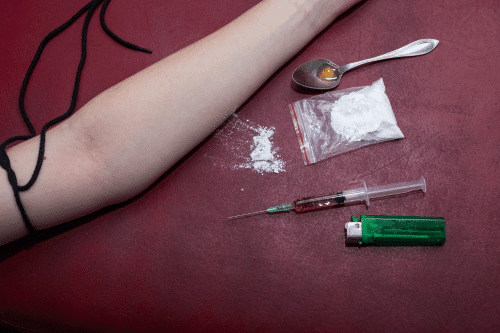Heroin Addict Signs: How to Identify the Symptoms
Introduction
Heroin addiction is a serious and life-threatening condition. Recognizing the common signs of heroin abuse early can save lives. The effects of heroin abuse go beyond physical changes—they impact mental health, behavior, and relationships. Many heroin addicts face multiple challenges, including mental disorders, co-occurring disorders, and psychosocial symptoms that worsen over a period of time.
Early detection of symptoms of heroin addiction can help prevent long-term effects. Knowing the risk factors such as family history, genetic predisposition, and access to heroin is critical for prevention and treatment.
Physical Indicators
Track Marks and Needle Entry Points
Evidence of injections—including track marks on arms, legs, or feet—suggests the use of an injection drug like heroin. Black tar heroin or brown powder is often injected, leaving visible punctures.
Changes in Physical Appearance and Hygiene
Poor personal hygiene, unhealthy complexion, and lack of attention to personal appearance may indicate addiction to heroin. Severe itching, excessive sweating, and a runny nose are also common symptoms.
Alternating Hyper-Alertness and Exhaustion
Heroin causes sporadic bursts of energy followed by deep fatigue. Users may show feelings of euphoria, then quickly fall into physical dependence with noticeable exhaustion and poor judgment.
Sudden Weight Loss or Unhealthy Complexion
Loss of appetite leads to sudden weight loss and nutritional deficiencies. Users may appear gaunt, pale, or have dilated pupils, constricted pupils, or bluish coloration due to low blood pressure or poor heart function.
Behavioral Signs

Declining Performance at Work or School
A drop in academic performance, frequent absences, and academic failure are common behavioral symptoms. Heroin interferes with mental functioning and automatic processes, impairing focus and motivation.
Lack of Motivation and Interest in Activities
Users may lose interest in things they once enjoyed due to depressive symptoms, cognitive impairment, or negative emotions caused by chronic heroin abuse.
Deceptive Behavior and Dishonesty
Deceptive behavior, feelings of hostility, and hiding a sticky substance or drug paraphernalia point to substance abuse. Dishonesty becomes common to hide the illicit drug use.
Concealment of Drug Paraphernalia
Finding needles, burnt spoons, rubber tubing, or small baggies suggests exposure to substance abuse and the use of a dangerous drug. Concealment shows the addict’s psychological dependence.
Psychological Symptoms
Mood Swings and Instability
Users may experience drastic mood shifts, depressed mood, or manic episodes linked to bipolar disorder, depressive disorders, or conduct disorder. Cognitive symptoms include poor concentration and impaired vision.
Anxiety and Paranoia
Heroin can worsen mental illnesses like anxiety, paranoia, or defiant disorder. These symptoms may be tied to changes in brain chemistry and nervous system depressants.
Depression and Withdrawal from Social Interactions
Heroin often leads to social withdrawal, detachment from surroundings, and suicidal ideation. Emotional numbness and feelings of relaxation may mask underlying mental health disorders.
Social and Relationship Changes

Isolation from Family and Friends
Users may isolate due to family discord, lack of family involvement, or feelings of shame. Heroin’s addictive tendencies can break down support systems.
Interpersonal Conflicts and Aggression
Increased aggression, hostility, or blame may arise. Conflict often stems from psychosocial symptoms and negative effects of substance use disorder.
Changes in Social Circles
Heroin users often change peer groups. Their new social circle may also struggle with substance abuse, alcohol addiction, or use other addictive substances.
Connection to Co-occurring Disorders
Common Mental Health Conditions in Addicts
Many users suffer from mental illness such as attention-deficit/hyperactivity disorder (ADHD), bipolar disorder, or depression. These mental health conditions often appear before or alongside heroin use disorder.
Impact of Dual Diagnosis on Treatment
A dual diagnosis complicates treatment. Opioid use disorder combined with mental illness requires an integrated approach from a mental health professional. Evidence-based substance abuse treatment is vital for recovery.
Withdrawal and Overdose Risks
Physical and Psychological Withdrawal Symptoms
Symptoms of heroin withdrawal include bone pain, abdominal cramping, cold flashes, joint pain, flu-like symptoms, and cravings for heroin. Psychological dependence leads to intense cravings, anxiety, and depressed mood.
Signs and Symptoms of Heroin Overdose
Effects of heroin overdose include heart attack, slow heart rate, chest pains, impaired vision, warm flushing, and shallow breathing. Heroin-related drug overdose deaths are often linked to high doses of heroin or mixing with other harmful drugs.
Immediate Actions to Take in Case of Overdose
Call emergency services. Use naloxone (Narcan) if available. Overdoses can lead to brain damage, heart failure, or death. A health care provider must evaluate the person immediately.
Importance of Professional Help
When and How to Seek Assistance
If someone shows variety of signs of heroin use, speak to a drug counselor or contact a heroin addiction treatment center. Don’t wait for the addict’s physical well-being to worsen.
Types of Treatment Programs Available
Opus Treatment provides treatment for heroin addiction, including detox, residential care, and outpatient programs. We address both heroin use and mental disorders.
Role of Therapy and Support Groups
Family therapy, individual counseling, and support groups help address addiction to heroin. Support systems play a major role in maintaining long-term sobriety.
Strategies for Intervention
Planning and Staging an Intervention
Interventions help break denial. With the support of professionals and family, you can guide the heroin user toward recovery. Prepare thoroughly and involve all necessary parties.
Communicating Concerns Effectively
Discuss concerns with love, not judgment. Point out the common disorders and adverse effects of heroin abuse on daily life, such as loss of employment, financial ruin, or medical conditions.
Gathering Support from Loved Ones
Build a team of supportive friends and relatives. Encourage everyone to understand genetic factors, environmental factors, and the development of addiction. This promotes unified action.
Support for Families and Friends
Resources for Coping with a Loved One’s Addiction
Use support groups like Al-Anon and resources from the Substance Abuse and Mental Health Services Administration (SAMHSA). They offer guidance and emotional support during recovery.
Supporting Recovery Processes
Long-term heroin use requires ongoing care. Help your loved one manage unpleasant withdrawal symptoms, attend therapy, and rebuild relationships. Stay involved through every stage of recovery.
Frequently Asked Question's
The most common signs of heroin addiction include both physical and behavioral changes. Physically, a person may have track marks from injections, constricted pupils, frequent nosebleeds, sudden weight loss, and poor hygiene. They might also display symptoms like excessive sweating, runny nose, and chronic fatigue. Behaviorally, users often isolate themselves, lose interest in activities, and experience financial problems or legal trouble. Other signs include lying, stealing, or hiding drug paraphernalia. These changes usually appear over a period of time and may suggest a growing dependence on heroin.
Heroin use directly impacts the brain’s chemical balance, often leading to or worsening existing mental health disorders. People struggling with heroin addiction may show symptoms of depression, anxiety, paranoia, and mood instability. In many cases, individuals have co-occurring disorders such as bipolar disorder or ADHD, which complicate treatment. Long-term heroin use can impair memory, decision-making, and emotional regulation. This combination of heroin abuse and mental illness is called a dual diagnosis and requires integrated treatment for both conditions.
Heroin withdrawal can cause a range of intense physical and psychological symptoms. These include abdominal cramps, muscle and joint pain, cold flashes, nausea, vomiting, insomnia, and excessive sweating. Users often experience intense cravings for heroin, anxiety, depression, and agitation. These unpleasant withdrawal symptoms can begin within hours of the last dose and may last several days. In some cases, psychological effects such as suicidal ideation or extreme distress may occur. Because of these risks, medically supervised detox is strongly recommended to manage symptoms safely and reduce the chance of relapse.
A person should seek professional help as soon as signs of heroin use or addiction appear. Waiting can lead to serious health risks such as overdose, heart failure, liver damage, or infectious diseases. Professional treatment is especially important for those with a personal or family history of substance abuse or mental illness. Programs like those offered at Opus Treatment provide structured care, including detox, therapy, and aftercare. These services help individuals safely manage withdrawal, address mental health disorders, and build long-term recovery skills. Early intervention greatly increases the chances of successful treatment.




